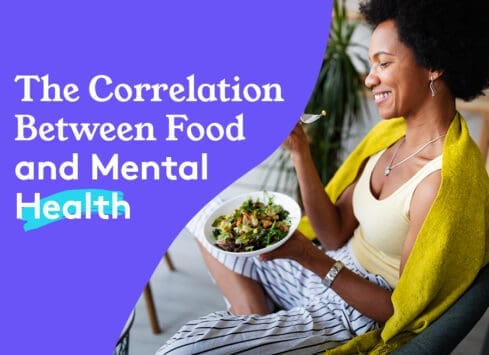The Correlation Between Food and Mental Health
By: Emily Pacetti, MS, RD, CSG, LDN, Regional Clinical Nutrition Manager / Director of Nutrition Systems at Cape Cod Healthcare
 Our daily routines, work schedules, and family lives have been turned upside down these last few years. Throughout the COVID-19 pandemic, many of us have experienced an array of emotions: exhaustion, overwhelm, and sadness, to name a few. It’s likely that our food habits and exercise routines may have changed… some for the better and some for the worse.
Our daily routines, work schedules, and family lives have been turned upside down these last few years. Throughout the COVID-19 pandemic, many of us have experienced an array of emotions: exhaustion, overwhelm, and sadness, to name a few. It’s likely that our food habits and exercise routines may have changed… some for the better and some for the worse.
The pandemic has certainly taken a toll on our routines, but did you know that the food we eat has a huge impact on our mental health? The field of nutritional psychology is “the study of how nutrition and mental health interact and how we can help improve our mental well-being and health through better nutritional choices.”
The foods we consume are the building blocks for our brain’s essential compounds to function adequately. Suppose we consume high fat, high sugar, ultra-processed foods. In that case, we are depriving our brain of the crucial nutritional compounds, which can result in the suboptimal function of the brain, leaving us with feelings such as depression, anxiety, poor sleep, and fatigue. Making small cumulative changes over time can make meaningful and impactful changes to our mood and overall sense of well-being.
Several studies have demonstrated that a “Western” diet high in saturated fat, sugar, and ultra-processed foods contributes to poorer mental health outcomes such as anxiety, depression, and possibly anger. Additional studies have shown a correlation between increased consumption of fruits, vegetables, and whole grains and a decreased consumption of ultra-processed foods that can reduce depressive and anxious symptoms.
The link between your gut and brain is complex, but studies have shown simple changes we make can have a meaningful impact on our mood, behavior, and sense of well-being. Two examples of “happy” neurotransmitters are dopamine and serotonin. These neurotransmitters rely on our dietary intake to provide the body and brain with the necessary building blocks to synthesize these neurotransmitters.
It’s important to understand that nutritional supplements are not equivalent to whole foods. There are many components of whole foods, including the variety of vitamins, minerals, polyphenols, fiber, and healthy fats that supplements cannot provide. It’s not just about adding foods into your diet but limiting those foods known to contribute to reducing mental health performance.
Here are my recommendations on foods to avoid and add.
Foods to Avoid:
- Added sugars, ultra-processed foods, and bad fats (saturated and trans-fat) – all are pro-inflammatory. This inflammation is believed to play a role in the development of depression. One study showed participants who drank two and a half cups of soda a day had a 25 percent increase in depression.
- Artificial sweeteners are known to alter the levels of our neurotransmitters, which play a part in regulating our mood.
Foods to Add to your Diet:
- Omega 3 fatty acids – are anti-inflammatory and have vital functions to keep our brain functioning optimally, such as protecting neurons from inflammation. Great sources of omega 3 fatty acids include salmon, sardines, tuna, grass-fed beef, walnuts, and chia seeds.
- Fermented foods – provide the gut with “good” bacteria. Studies have suggested that improving the gut bacteria can mitigate the stress response, which is pro-inflammatory and increases vital neurotransmitters. Examples include yogurt, kimchi, and sauerkraut.
- Whole grains – provide essential vitamins, minerals, fiber, and healthy fats to the brain. Folate and vitamin B12 are two vital vitamins in the function of the brain. Low levels of those vitamins have been associated with higher rates of depression.




